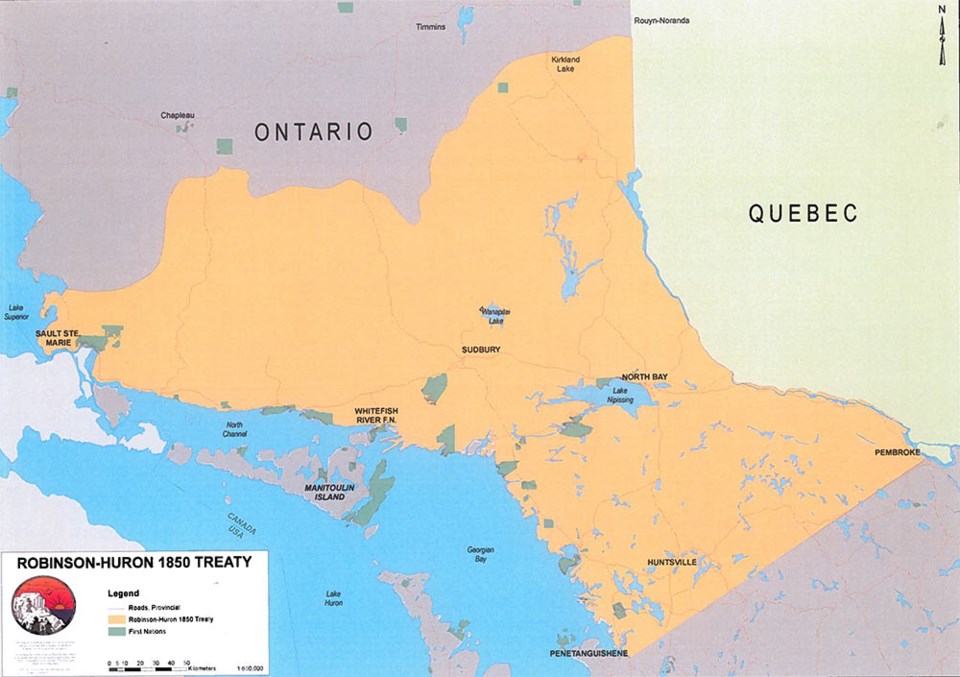On the 171st anniversary of the signing of the Robinson Huron Treaty of 1850, the 21 signatories are calling on the Crown to “fulfill the judgments and declarations of the Ontario Superior Court of Justice,” reads a statement from the Robinson Huron Treaty Anishinabek.
Sept. 10 was the anniversary of the signing of the Robinson Huron Treaty between the Anishinabek that live across much of Northwestern Ontario and William Benjamin Robinson, a representative of the Crown.
In 2021, the discussion around the administration of the treaty is ongoing. Despite court decisions in favour of the Anishinabek, represented by 21 signatory First Nations, the augmentation or “escalator” clause continues to be an issue. In 2012, the Robinson Huron Treaty Anishinabek came together and formed the litigation fund, pushing to finally receive the funds they —and later the courts—felt were due to them.
That’s because as part of the treaty, the Crown promised to pay a perpetual annuity of £600 ($2,400), which in 1850 worked out to approximately $1.60 per person. But Robinson provided an additional incentive for the Anishnabek communities to sign.
It is called an “augmentation clause” and it reads “[...] should the Territory hereby ceded [...] at any future period produce such an amount as will enable the Government of this Province, without incurring loss, to increase the annuity hereby secured to them, then and in that case the same shall be augmented from time to time.”
Basically, if further wealth was generated in the territory, the Crown is obligated to increase the annuity “to such further sums as Her Majesty may graciously be pleased to order.”
It is safe to say that there was further wealth generated in the area. Mining, logging and supplemental industries are all able to profit from the resources the land provides.
In 1874, the annuity amount, (the yearly payment) was raised to $4 per person. The amount has not changed since, and this is the subject of the court cases which were decided in favour of the Anishinabek. The federal government did not pursue an appeal and has expressed a willingness to negotiate —but only with provincial participation. The provincial government has elected to appeal the decisions. The appeal is in stage three, awaiting decisions from stage one and two. You can read more about the details of those appeals here.
However, the decision has not progressed beyond that, a decision.
“Neither Canada nor Ontario has sought to stay the Stage 1 or Stage 2 Judgments of the Superior Court,” reads the release. “Yet to date, more than two years following the June 17th, 2019, judgment, and despite the legal obligations, declarations and determinations pronounced by the Superior Court, the annual annuity payments under the Robinson Huron Treaty have not been increased by the Crown beyond the $4 per person last fixed in 1875.”
The release states that the Crown has “taken no steps,” to implement the treaty augmentation promise on a “go-forward basis.” While the release reads that “the Petitioners and Memorialists acknowledge that the quantification of past compensation is part of stage 3,” they state there is no reasonable basis for the Crown’s failure to implement the augmentation promise going forward.
In honour of the Treaty anniversary, a gathering was held. The Chiefs of each of the 21 nations signed a petition addressed to Governor General Mary Simon and Lieutenant Governor Elizabeth Dowdeswell. The petition echoes the call that the Robinson Huron Treaty Litigation Fund has made for over a decade: “it is time for the Crown to act honorably in accordance with the law.”
